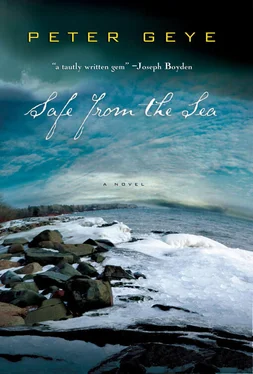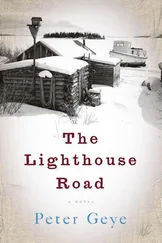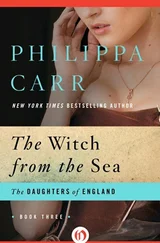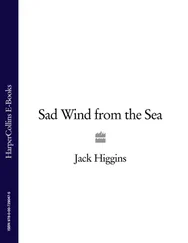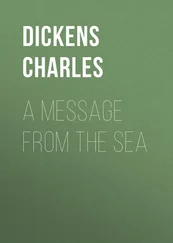“Anyway, I got interested in what the captain was teaching me. I used to watch him take his sights, consult our charts, mark our position, do the math. After a couple seasons I had a real sense for this stuff. I could keep time in my head. I knew where we were all the time. I got good at it.
“You see there?” he asked Noah, pointing nearly straight up at a cluster of bright stars. “That’s Andromeda, you can tell by the spiraling cloudiness of it. It’ll be lower in the sky in the next month. That’s Cassiopeia to the left there. That’s Auriga there, and that’s Capella, that bright star right on the edge of that cluster. You can’t see Orion or Betelgeuse now because they’re too low on the horizon. Jesus, those stars are a long ways away. I can hardly even think about it now. But I’ll tell you what”—he coughed to clear his throat and nodded affirmatively—“I used to sail by their light — I used to sail by Andromeda’s light — and I got around just fine.”
A long silence ensued, Olaf still calculating some impossible star equation with the tip of his finger, still conducting, Noah thought it looked like, some star symphony.
“The galley would start serving breakfast at six o’clock on every ship I ever sailed. Those first couple seasons I’d sit on deck until right before chowtime, take my morning sight, then head to the galley and eat breakfast like it was meant to be eaten.” He smacked his lips. “Buttermilk pancakes drowning in syrup, eggs, hash browns, bacon and sausage, coffee, juice, fruit. Sometimes we’d even have chops or steaks. We all ate like that, all the time. It was one of the perks for living on those boats. I still remember what it felt like to be that full. I’d go back to my cabin, slide off my boots, and lie down on my bunk.” He sighed. “Didn’t have a goddamn thing to worry about in that sleep. Nothing.”
“But later,” Noah said.
“I’ve never been a good sleeper, but those mornings were pretty damn fine. After your mother and I got hitched and you came along, the sleep got a little bit tougher. I was ten years into my career when I met your mother, though. There was nothing else I could do.”
Olaf stood and stretched. “It all blends together for me now, everything before the Rag . Each of the ships and each of the years have turned out to be the same thing unless I’ve got pictures to remind me. But I’ll tell you what, my life was split the night she sank.”
Olaf had adjourned to bed with only a nod. So many old feelings had been uncorked down on the beach, not least of which were the ones Noah had been expecting most, the anger and reproach years in the making, stirred up by the mere mention of his mother and her wanting to play piano at his wedding.
Noah had sent his father a wedding invitation as if he were a distant relative. The reply had come by way of his sister, who had told Noah their father intended to make the drive east by himself. Noah did not believe he would, but on the night before his wedding, Olaf showed up.
They held the rehearsal dinner at Natalie’s parents’ Swampscott home, a beautiful place with huge oak trees in the front yard, a deck overlooking Foster Pond in the back, and a red-brick chimney set against the clapboard siding. When Olaf stepped from his old Suburban and looked up at the three-story house, Noah felt heartsick. In order to quell the sadness he doubted his father deserved, he summoned his anger instead, put it on as if it were a coat of arms. From the window of the foyer he could see that the old man looked presentable if rustic. His beard and hair were longer than they’d been, but they were also more kempt. The corduroy pants and rumpled chamois shirt were at least clean. Instead of boots he wore a pair of chocolate-brown, size fourteen loafers. It wouldn’t have surprised Noah to find the box they’d come in on the floor of the truck.
They met at the front door, shaking hands as they had before breakfast at the Freighter. Noah said, “Nice shoes.”
The look of smug satisfaction on the old man’s face said all Noah needed to know.
Grudgingly, Noah said, “Come on, I’ll introduce you.”
Having been cautioned about the impending and inevitable debacle, Natalie graciously ignored Noah’s warnings. She treated Olaf like her own father from the start. When she introduced him to her parents, Olaf offered them a gift.
Natalie’s mother sold real estate and presented the agent’s facade that everything was always fantastic. In fact, she was a whip-smart pessimist with a master’s degree in art history. Mr. Maier had served as an Essex County public defender for thirty years before retiring that summer. As they leaned against the granite countertops of their newly remodeled kitchen, sporting their Ralph Lauren garb, each with a long-stemmed glass of chardonnay, Noah knew the cut of their jib would not sit well with his father. In fact, he knew his father hated people like them, people who had no discernible faults, no tragedy in their lives.
“What is it?” Mrs. Maier said, withdrawing a brown bottle from the paper sack.
“This is aquavit, Linie aquavit, to be precise. Comes from Norway. I have a friend, captain’s a salty running Minnesota wheat to South Africa, he brings me a case each year.”
“This is very thoughtful, Mr. Torr.”
“This stuff has been across the equator twice. There’s caraway in it, and in order to blend the flavors, it needs the roll and pitch of the ocean waves. This bottle started out in Norway, crossed the Atlantic, come up the St. Lawrence, went back down the St. Lawrence, spent a week bound for Cape Town, then back again to Duluth. Now here it is. Won’t work for taking paint off the house, but enough of it will put the feeling fine in you.”
“Should we open it?” Natalie asked.
“Save it for a special night,” Olaf said. “There must be something else to drink around here.”
Noah led his father to the study, where two guys in tuxedos manned the bar. Olaf ordered a drink and turned his attention to the room.
“What is all this shit?” he said. “It looks like some kid’s bedroom.”
“Mr. Maier is a huge Red Sox fan. This is his memorabilia. You don’t even have to ask and he’ll tell you Johnny Pesky grew up right down the street.”
They stood silently for a few minutes while Olaf looked over the autographed baseballs and jerseys, the framed ticket stubs and bobble heads. “Well, it beats the hell out of me. To each his own, I guess.”
“Listen, he’s a really good guy. They’re all good folks. Take it easy on them.”
Olaf had already turned back to one of the bartenders and signaled for another. “Take it easy on them? What am I, a lout? Chrissakes, I’m here. I brought them a gift.”
“That was thoughtful,” Noah admitted.
Olaf quaffed the first third of his cocktail in a single, effortless pull. “Anyway, I don’t need a goddamn babysitter.”
“I know.”
“Then go mingle with your friends.”
At the end of the rehearsal dinner Olaf stood at the curb with a half-drunk beer in his paw. He had his eyes on the night sky. Noah stepped from the front door and walked down the brick footpath to say good-night.
“There isn’t a cloud in the sky and still hardly a star to be seen,” Olaf said. “But you can goddamn smell the ocean.” His words were slightly slurred. “Funny, all that time on a boat and I never saw the ocean.”
“How about I take you back to the hotel?” Noah said.
“I’m okay to get back to the hotel.”
“Really,” Noah insisted. “I can show you the town. Solveig can drive you to the wedding tomorrow.”
Olaf relented.
The silence on their short trip was broken only by the din of traffic. When they pulled up under the hotel marquee, Olaf drummed his fingers on the dash. “Why don’t you come in for a nightcap? The least I can do is buy my son a drink the night before his wedding.”
Читать дальше
